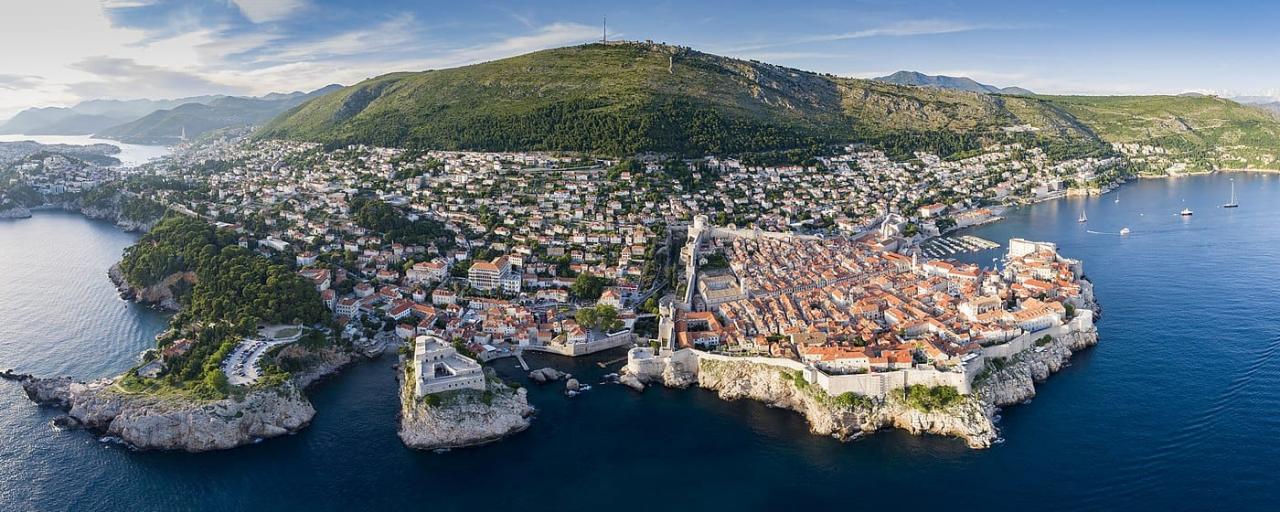
Dubrovnik shouldn't only be known for its problems with mass tourism or its UNESCO uniqueness. It should also be known for its longstanding tradition of active citizens and NGOs. In the last decade of their organisational development, NGOs have been preparing and taking the next step in the form of civil-public partnerships and social-cultural centres. In Dubrovnik, there are two successful examples: Platform for Lazareti and Youth Center. As it is common when forming new alliances and especially social-cultural centres (NGO Houses as in the case of Riga, the Lead Partner City of the ACTive NGOs URBACT network), the question of suitable governance and decision-making models is the most important, but also a rather difficult one. However, with the help of the knowledge transferred in the “ACTive NGOs” project, these centres may have found the solution for this issue.

Illustration 1. Youth Center Dubrovnik and Social-cultural center Lazareti
Platform for Lazareti and Youth Center
It is well known that Dubrovnik has been dealing with the issues of overtourism for the last two decades. In this period, a lot of the public spaces and common goods have been commodified, commercialised and put to almost exclusive tourism use. As a result, the space for civil society has been significantly shrinking. At the same time, communication between the Municipality and the NGOs is still in need of improvement and stabilization. To resolve these issues and further stabilize the civil scene, Platform for Lazareti and Youth Center have been working on establishing their centres based on the notion of public-civil partnership and exploring the models and modalities of participative governance.
There is a number of discussions that needed to be had and resolved by the aforementioned actors when reaching their goal. Firstly, a public-civil partnership requires strong cooperation between the NGOs and the local administration. Secondly, the idea of a social-cultural centre requires a strong connection to the local community and their needs. And lastly, the idea of the ideal forms of civil-public partnership is burdened by the top-down policies of the recommended and legally available formal models: public institution, publicly-traded company, cooperative, foundation. All of these formats were recognized by the centres as unsuitable, too formal, and a potentially bureaucratically overburdening to their current business models. Therefore, each of the centres began from their local starting point and context and set out to find a suitable collaboration model that will allow them to communicate better and collaborate not only as NGOs working and/or residing in the mentioned spaces but also with the City of Dubrovnik as the owners of the spaces.
Platform for Lazareti is an unofficial advocacy association consisting of 5 NGOs residing and/or working in Lazareti. They are dedicated to developing the idea of Lazareti as a horizontally integrated social-cultural centre open to the local community and their needs. During the last year and a half, they have been working on the Platform for Lazareti Regulations to make their collaboration more efficient and official, but also to help them open up their spaces in Lazareti to other users. At the same time, the making of the Regulations was an ideal beginning of establishing a better collaboration model for Lazareti with the City of Dubrovnik and their representatives, the public company Dubrovnik Heritage d.o.o. This company signed a contract with the City of Dubrovnik in September of 2019 to govern the Lazareti complex by the principle of the social-cultural centre. Ana Cvjetković, a representative of Platform for Lazareti sees well-articulated protocols as a key condition of successful co-governance:
„By creating and implementing protocols of conduct you establish very clear relationships which enable successful collaboration through mutual planning and clearly defined goals. To ensure that everyone respects the rules, you need to write them down. Through the protocols, we will also create a basis for more effective and organized usage of the spaces of the Lazareti complex whilst opening them up for the community to use.”

Illustration 2. Platform for Lazareti Regulations describing their membership, governing structure, main directions of action, spaces and assets as well as rules of lending out the spaces and joining the Platform
Youth Center is a civil-public collaboration platform for developing and providing programmes for youth. They have opened their new headquarters in August of 2020, and have announced that their membership reached eleven NGOs. In the last year, they have been preparing the organic horizontal model for their centre based on the efforts of several working groups.
As Gjino Šutić (Youth Center) noted:
„When it comes to cooperation between the civil and public, not only in Dubrovnik but in Croatia as well, public administration is usually the passive party which only finances – they give you the money and then you need to justify your costs by tons of paperwork. We wanted to establish complete equality and active participation between the partners, so we've used this organic horizontal structure which allows us to have decentralized governance. In such a way, if one piece fails, the rest of the structure can continue.”
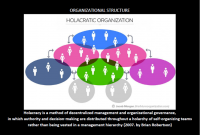
Illustration 3. Youth Center's organic horizontal model was inspired by the concept of holacracy
The needed help arrived in Syracuse
As it is already noted, the two centres had to at the same time find a suitable way to stabilize and further develop the public-civil partnership, develop ways of opening up the spaces to the local community and think outside the given box of models. The help that was very much needed came from the third international „ACTive NGOs” meeting held in Syracuse (IT) in October of 2019. The topic was governance, communication, and decision-making structures. It gave the partners another perspective on how to make participatory governance simpler and more effective.
A very important input and confirmation of the ideas that Platform for Lazareti and Youth Center had, came from the Italian innovative and unique approach to governing and regulating urban commons written in the Bologna „Regulation of collaboration between citizens and the City (…) “. This Regulation emphasized the idea of the „right to co-city “or in other words, it emphasised the idea that the city is a shared resource open to different actors through the formal recognition of collective governance and stewardship rights. Stewardship is one of the main values of the Youth Center, as explained by Anja Marković (Youth Center):
„We want the youth of Dubrovnik to own the centre, not just visit it. To be an active partner in developing it, and taking responsibility for it as well so that they can inherit it someday. “
The second very important input and confirmation were given through the examples of co-governance carried through the involvement of the local community in designing, managing, and delivering new forms of activities and with great benefits to the centres and the community itself. This is something that resonated with the Platform for Lazareti which in the summer of 2019 implemented their first open call for the citizens and other NGOs to apply with their activities to be organized in the Platform's spaces. Thirdly, the knowledge transferred from the meeting helped the partners to think outside the box, look at their situation holistically, and to find the modality of governance which is the most suitable for their own needs and capacities. only important premise was the notion of regulated equality and participation.
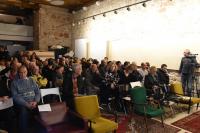
Illustration 4. Activity implemented through the Open Call: citizens' assembly (City district Ploče iza Grada where Lazareti are located).
(held in February 2020 before the coronavirus lockdown)
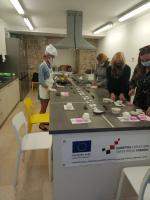
Illustration 5. Activity implemented through the Open Call: „Stagioni di cioccolata“ – chocolate workshop
So, how to go back to the basics?
Partners from Syracuse (IT) kindly shared with the rest of the partners their Regulation for the governance and usage of their spaces (Regolamento della Casa delle associazioni e del volontariato di Sesto San Giovanni; Regolamento per la gestione ad utilizzazione della casa delle associazioni; etc.). These protocols helped to finish the Platform for Lazareti Regulations which not only regulates the relationships and spaces Platform shares but also the criteria and rules of lending spaces to other NGOs and citizens for their activities. It was also very useful in finishing the lists of tasks of the working groups in the organic horizontal model that Youth Center has been developing.
An additional document sent by Syracuse titled „Carta dei Servizi“ was helpful to Platform for Lazareti in many ways. Firstly, the structure of the document helped the Platform in preparing the document which will be sort of a “instructions to Lazareti”, a pamphlet in which the complex Lazareti will be described alongside the organisations working there (their program, contact, webpages, social media, information about the available spaces and under which conditions it’s possible to use them, some interesting facts). The main goal of the „guide” is to open up the spaces of the Lazareti to the wider community and help them get in contact with the organizations.
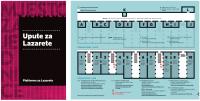
Illustration 6. „Instructions for Lazareti“ includes the map showing and describing all the actors residing in the complex and their contact info
Additionally, to make their spaces known and available to the broader public, Platform for Lazareti will add a contact form to their social media and webpages where the interested organizations and citizens can book spaces for their activities. A great help in designing the form was found in the questionnaire from the Riga's NGO House. The final form will, therefore, consist of the basic information about the applicant, the chosen space (there will be a short description of each of the spaces), the date, duration and type of the activity (allowed types of activities were defined by the Platform for Lazareti Regulation), a short description of the activity, whether the activity has a participation fee or not and which equipment is needed (list of the available equipment that the Platform can provide will be attached). Alongside the contact form, the terms of fair use will be noted, also in accordance with the Platform for Lazareti Regulation. All of these were the necessary tools to ensure equal participation supported by regulated equality and helped the Platform for Lazareti and Youth Center to find new forms of governance models suited to their needs and capacities.
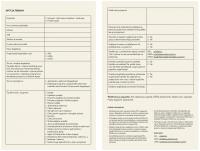
Illustration 7. Excerpt from the „Instructions for Lazareti“ – contact form for booking the space of the Platform
Challenges in ‘transferring’
As it was previously mentioned, Youth Center Dubrovnik and Platform for Lazareti at the local level have been faced with a shortage of spaces for civil society and a case of unstable communication and collaboration with the City of Dubrovnik. The solution for these problems was found in establishing social and cultural centres (NGO Houses) based on the civil-public partnership and modalities of participatory governance. During this time, they were faced with the challenges of securing active and regulated participation of everyone involved as well as finding suitable ways of opening up the spaces to the local community for their activities. Both of the platforms concluded that the recommended and legally available formal models were unsuitable, too formal, and potentially bureaucratically overburdening to their current business model.
They have drawn inspiration for their own local regulations and also governing models from the other partners, especially from the Syracuse and Riga examples. However, it is important to be noted that social-cultural centres are largely defined by their local contexts and communities. For example, both of the platforms in the Dubrovnik case have grown by the bottom-up principle based on their long-term presence in civil society. By growing in their reputation, knowledge, finance, and experience, they were ready to do the next step in their development - social-cultural centres. The City of Dubrovnik recognized that they are capable of going through with the idea and said yes to the proposal of civil-public partnership. In this sense, they slightly differ from the City of Syracuse and the City of Riga which has a greater impact on shaping the social-cultural centres (NGO Houses) than it is the case in Dubrovnik where these centres already have a long, autonomous history. What is to conclude from this challenge is that when considering the development and growth of the NGO House, their local context seeks for an organic and a more flexible approach led by the modalities of governance rather than models, meaning bottom-up solutions for national and international policies.
Support from URBACT
In order to help Dubrovnik, use the good practices of Riga and Syracuse, support from the URBACT programme has been manifold. The topic of governance and decision-making has helped in resolving the main dilemmas partners had at the beginning of this process. The knowledge gained at the Syracuse meeting with very concrete examples of the regulations helped the two centres in Dubrovnik in accomplishing a more suitable governance model that guarantees participation from the NGOs, the City of Dubrovnik, and the local community. It also helped in developing online and offline tools for opening up the spaces of the Platform for Lazareti to other NGOs and citizens for their activities. Additional workshops organized during the project also helped the process significantly. A strategic planning workshop was organized for the Youth Center and the data generated by it will be a base for their future Strategic Plan 2021-2023, the first one in their history as a platform. A PR and media workshop organized for the Platform for Lazareti and the media plan developed at the occasion helped significantly in terms of promoting the Platform to the local community.
One of the main accomplishments of the project was made through organized ULG meetings, workshops, and international meetings which brought together partners who didn't get the chance to communicate or collaborate before. In such a way, the communication has become better on three different levels: between the members of the NGOs in the centres, between the two centres, and between the centres and the City of Dubrovnik.
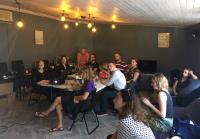
Illustration 8. Dubrovnik ULG meeting, September 2019
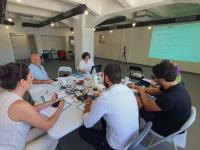
Illustration 9. Strategic planning workshop in the Youth Center, July 2020
Conclusion
The ACTive NGOs network and its emphasis on knowledge transfer and bettering of the communication between the civil and public actors have helped Platform for Lazareti and Youth Center Dubrovnik in many ways. Besides gaining invaluable knowledge from other partners, Lead Expert, and Ad-hoc Experts, it helped to resolve one of the most important questions in the newest developmental phase of social-cultural centres not only on a local level but also on a national level: how to accomplish equal participation in a public-civil partnership and participatory governance in social-cultural centres? Learning from the other partner centres in the project, the platforms concluded that there are no two NGO Houses or social-cultural centres alike. Their governance model and approach to civil-public partnership need to be adjusted to its local context, capacities and the needs of the local community, meaning they need to follow modalities of governance, not models. The protocols of governance and cooperation need to be flexible and permeable enough not to be an additional burden to the actors involved and they need to follow organic growth and preferably, a horizontal decision-making structure. This bottom-up case conclusion is the one that will be communicated to the policymakers to better the policy and legal framework for social-cultural centres in Croatia.
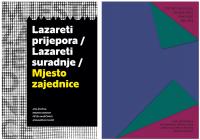
Illustration 10. Two of several research publications financed through the program „Culture in center“ (European Social Funds) on the topic of participatory governance and civil-public partnerships which will inform new policy changes for social-cultural centers in Croatia
Petra Marčinko, Dubrovnik ULG coordinator

